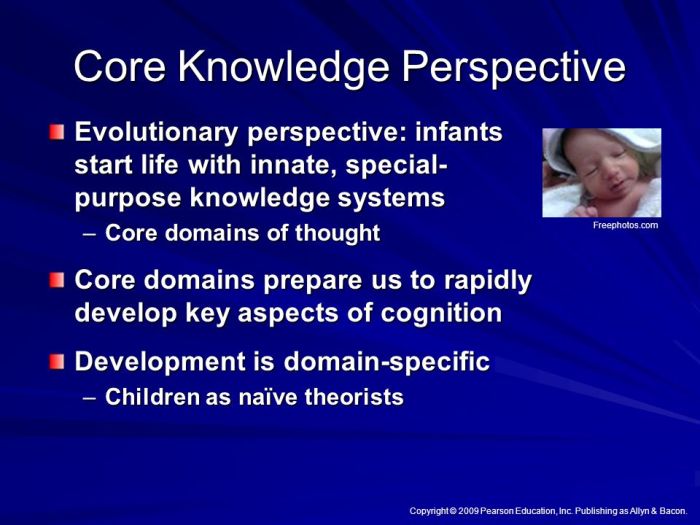Infants are born with domain-specific innate knowledge systems according to research, providing a foundation for their cognitive and social development. These systems, such as language, social cognition, and numerical reasoning, shape infants’ interactions with the world and their ability to learn and adapt.
Experimental studies have demonstrated the presence of these innate knowledge systems, revealing infants’ remarkable capacities for language acquisition, social understanding, and problem-solving.
Introduction

Infants are born with a remarkable capacity for learning and adapting to their environment. This ability is supported by a set of domain-specific innate knowledge systems that provide them with a foundation for understanding and interacting with the world. These systems are specialized for processing and representing information in specific domains, such as language, social cognition, and numerical reasoning.
Evidence for Innate Knowledge Systems

Experimental studies have provided compelling evidence for the existence of innate knowledge systems in infants. For example, research on language acquisition has shown that infants can discriminate between different speech sounds and grammatical structures even before they are exposed to language.
Similarly, studies on social cognition have demonstrated that infants are sensitive to social cues and can engage in simple forms of social interaction.
Origins of Innate Knowledge Systems, Infants are born with domain-specific innate knowledge systems according to
The origins of innate knowledge systems are still debated, but several theories have been proposed. One theory suggests that these systems are genetically programmed and emerge as a result of evolutionary pressures. Another theory proposes that they are shaped by environmental experiences in the womb or during early infancy.
A third theory suggests that they are a combination of both genetic and environmental factors.
Implications for Development

Innate knowledge systems play a crucial role in infants’ cognitive and social development. They provide a foundation for language acquisition, social interactions, and problem-solving abilities. By understanding these systems, we can better support and enhance infants’ development.
Assessment and Intervention: Infants Are Born With Domain-specific Innate Knowledge Systems According To

There are various methods for assessing innate knowledge systems in infants, such as behavioral observations and standardized tests. These assessments can help identify infants who may need additional support in specific areas. Interventions can be designed to support and enhance these systems, such as language stimulation programs or social skills training.
Questions Often Asked
What are domain-specific innate knowledge systems?
Domain-specific innate knowledge systems are cognitive structures that infants possess at birth, providing them with a foundation for understanding and interacting with specific aspects of the world, such as language, social cues, and numerical concepts.
How do infants acquire innate knowledge systems?
The origins of innate knowledge systems are still debated, with theories suggesting a combination of genetic predispositions, environmental influences, and evolutionary pressures.
What are the implications of innate knowledge systems for infant development?
Innate knowledge systems play a significant role in infants’ cognitive and social development, shaping their language acquisition, social interactions, and problem-solving abilities.